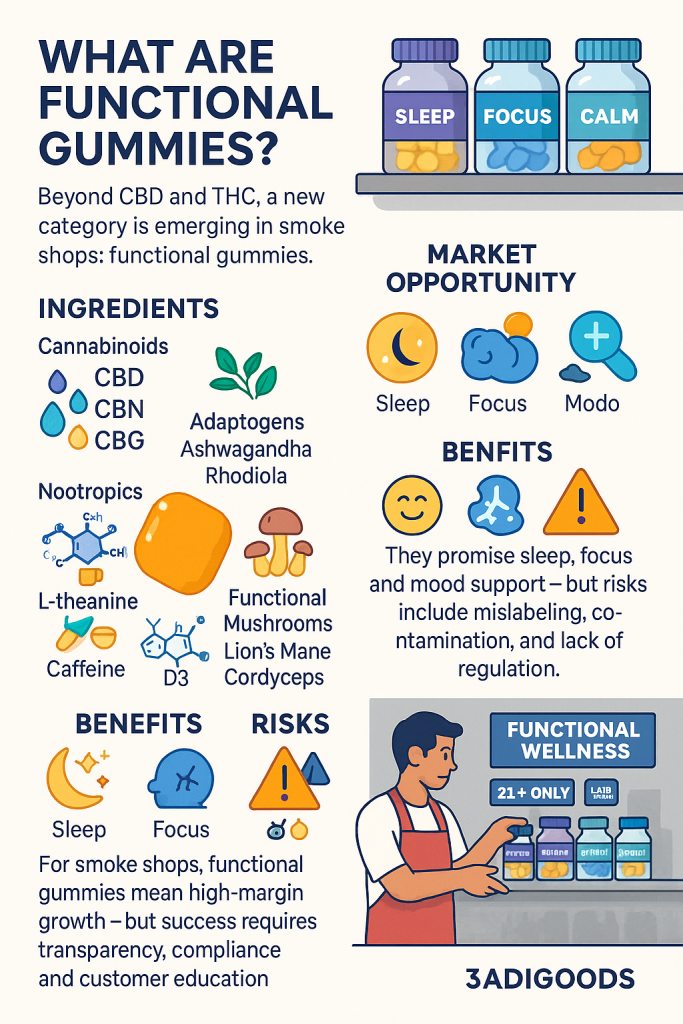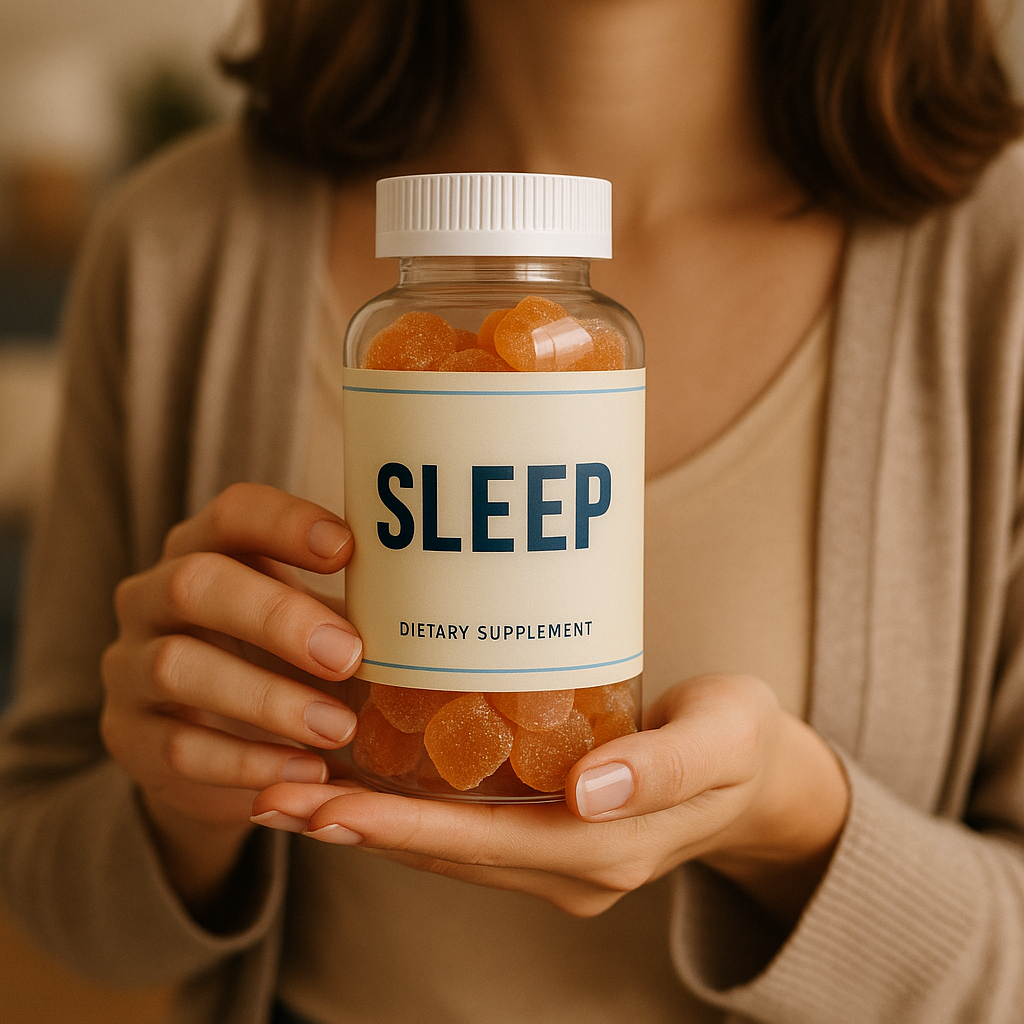The Rise of Functional Gummies in Smoke Shops: Beyond CBD and THC
1. Introduction / Hook – Why Functional Gummies Are Making Headlines

In July 2025, the FDA formally recommended that 7-hydroxymitragynine (7-OH) — a kratom-derived compound showing up in smoke shop gummies — be placed on the controlled substances list. Regulators warned that gummies containing 7-OH have been sold not only to adults but have also been marketed in child-friendly packaging, raising alarms for public health and enforcement ([Reuters][1]).
At the same time, mushroom-based gummies have triggered recalls and public safety alerts after testing revealed illegal psychoactive substances like psilocybin in products marketed as “functional wellness” treats ([UVA Health][2]). These incidents underscore the risk when innovation races ahead of regulation.
For smoke shops, this sets the stage for one of the fastest-emerging niches: functional gummies. Unlike traditional CBD or THC edibles, these products are being formulated with cannabinoids, adaptogens, nootropics, mushrooms, and botanicals — designed not just to relax or intoxicate, but to promise better sleep, sharper focus, or improved mood.
“Many products containing 7-OH are available in vape stores and smoke shops … the compound is present in … children’s gummies.” — [Reuters][1]
The result? A category full of opportunity and risk, where retailers must learn to balance consumer demand, compliance, and safety.
2. What Are Functional Gummies? – Beyond CBD & THC

Functional gummies represent the next evolution of edibles. While traditional CBD or THC gummies are designed primarily for relaxation, euphoria, or pain relief, functional gummies are formulated with multiple active ingredients to deliver a specific function — such as better sleep, sharper focus, stress reduction, or mood balance.
Key Ingredients in 2025
- Minor cannabinoids: CBN (sleep), CBG (focus), THCV (energy and appetite control).
- Adaptogens: Ashwagandha, rhodiola, ginseng — linked to stress management and resilience.
- Nootropics: L-theanine, natural caffeine, green tea extract — targeting memory, focus, and productivity.
- Functional mushrooms (non-psychedelic): Reishi, lion’s mane, cordyceps — associated with immune support, energy, and cognitive clarity.
- Vitamins & minerals: B12, magnesium, vitamin D3 — reinforcing the “daily wellness” positioning.
What Makes Them Different from CBD/THC Gummies?
- Multi-functional design: not just about “relaxation” or “getting high,” but about wellness outcomes like sleep, energy, or calm.
- Microdosing & combinations: lower doses across multiple compounds for frequent or daily use.
- Wellness-style presentation: sleek packaging, clean labels, often indistinguishable from dietary supplements.
- Broader target audience: appealing not only to cannabis users but also to wellness-oriented consumers who may not normally shop for hemp or THC products.
In short, functional gummies are blending recreation with wellness, creating a hybrid category that is attracting retailers, wellness seekers, and regulators alike.
3. Market & Trend Signals (U.S.)

The functional gummy trend is still in its early stages, but the U.S. market signals show massive potential. Gummies remain the #1 format for hemp-derived products, and innovation is pushing them beyond just CBD or THC.
Market Size & Growth
- The U.S. CBD gummies market alone is projected to reach $4.7 billion in 2025, serving as the baseline for expansion into broader functional blends ([Future Market Insights][3]).
- Analysts expect functional gummies (combining cannabinoids + nootropics/adaptogens) to capture a growing share of the $10+ billion U.S. hemp edibles market by 2030.
Emerging Trends
- Micro-dosing & stackable effects: Consumers are moving away from high-dose THC gummies toward low-dose blends they can use daily without impairment.
- Hybrid formulations: Products like CBN + melatonin sleep gummies or CBD + ashwagandha stress gummies are rising in popularity ([Arvida Labs][4]).
- Wellness crossover: Gummies marketed with terms like “Calm,” “Focus,” or “Immunity” are entering mainstream supplement aisles, not just smoke shops.
- Innovation spotlight: Exhale Wellness launched hybrid THC gummies in 2025 targeting sleep support and relaxation, blending cannabinoids with functional extracts ([Yahoo Finanzas][6]).
Safety & Recalls
But growth hasn’t come without turbulence:
- In 2025, over 60,000 CBD gummies were recalled nationwide due to contamination concerns ([Yahoo][7]).
- Mushroom-based gummies like Diamond Shruumz were pulled after reports of hospitalizations and even deaths tied to mislabeling and illegal compounds ([Food & Wine][8]).
These incidents highlight a critical gap in regulation and quality control — an issue that smoke shops must take seriously if they want to play in this category.
4. Regulatory & Safety Challenges
While functional gummies are booming, they are also operating in one of the most legally complex and high-risk spaces in the smoke shop category. The blend of cannabinoids, adaptogens, and nootropics means these products straddle multiple regulatory frameworks — from tobacco control laws to dietary supplement rules.
Federal Oversight & Gaps
- The FDA has not approved functional gummies as dietary supplements or therapeutic products.
- Many popular ingredients — from mushrooms to herbal extracts — exist in a gray zone: legal to sell as food, but illegal if marketed with health claims.
- In July 2025, the FDA specifically recommended scheduling 7-hydroxymitragynine (7-OH), a kratom derivative found in some gummies, as a controlled substance — underscoring how quickly functional ingredients can be criminalized ([Reuters][1]).
Safety & Contamination Risks
- Mushroom gummies have been found to contain illegal psychoactive compounds like psilocybin and psilocin, leading to recalls and legal action ([UVA Health][2]).
- The Diamond Shruumz recall in 2025 followed multiple reports of illness and deaths linked to mislabeled mushroom gummies ([Food & Wine][8]).
- Even in the hemp space, over 60,000 CBD gummies were recalled nationwide in 2025 due to manufacturing and labeling violations ([Yahoo][7]).
State vs. Federal Mismatches
- Alabama passed new laws in 2025 regulating hemp-derived gummies and drinks — capping THC per serving and restricting retail channels ([AP News][11]).
- Other states like Oregon, Minnesota, and New York are reviewing bans or restrictions on hemp-derived gummies with “functional” additives.
This patchwork means a product legal in one state may trigger seizures or fines in another.
Labeling & Claims
- Gummies making claims like “treats anxiety,” “improves focus,” or “cures insomnia” are at risk of FDA or FTC enforcement.
- Retailers share liability if they sell products marketed with misleading or illegal claims.
💡 Key Takeaway for Smoke Shops: The functional gummy space offers huge potential, but also carries real legal, financial, and reputational risks. Retailers should vet suppliers carefully, demand third-party lab tests (COAs), and avoid carrying products that make unverified medical claims.
5. Health & Consumer Profiles

Functional gummies are marketed as wellness boosters — but the science, and the user experience, are still developing. This makes understanding the health profile and consumer base essential for smoke shops.
Potential Benefits (Claimed by Manufacturers)
- Sleep support → CBN or melatonin blends marketed as “night gummies.”
- Stress & relaxation → CBD + ashwagandha or rhodiola formulations.
- Mood & focus → THCV, lion’s mane mushroom, L-theanine, or caffeine.
- Immunity & energy → Reishi or cordyceps mushrooms paired with vitamins.
These benefits are claims, not FDA-approved medical statements — meaning shops must promote cautiously.
Risks & Unknowns
- Addiction & dependence: Cannabinoid-heavy gummies (esp. THCp, THCV) may carry psychoactive or dependency risks.
- Contamination & mislabeling: As seen in 2025 recalls, products can contain unlisted or illegal ingredients.
- Unknown long-term safety: Few clinical studies exist on combining cannabinoids with adaptogens or mushrooms.
- Youth appeal: Bright packaging and fruity flavors can attract underage buyers — increasing legal risk for shops.
Who Is Buying Functional Gummies?
- Wellness Seekers → Non-smokers and non-vapers looking for natural, plant-based supplements.
- Cannabis Consumers → Users already familiar with CBD/THC, exploring functional blends as “everyday” options.
- Alternative Lifestyle Users → People experimenting with microdosing, nootropics, or wellness stacking.
- Casual Users → Shoppers drawn in by flavors, sleep support claims, or curiosity in smoke shops.
Usage Patterns
- Microdosing → 1–2 gummies daily for balance and function.
- Stacking → Combining gummies with supplements, drinks, or vapes.
- Occasional Use → “Sleep gummies” at night, “focus gummies” before work or study.
💡 Retail Takeaway: The audience is broader than traditional cannabis buyers. Stocking functional gummies may bring in wellness-driven shoppers who wouldn’t otherwise visit a smoke shop — but only if products are positioned responsibly.
6. Opportunities & Strategy for Smoke Shops
The rise of functional gummies presents a rare chance for smoke shops to capture new customers, diversify revenue, and position themselves as wellness-oriented retailers. But success requires a strategy that balances innovation, compliance, and education.
Opportunities
- First-mover advantage: Retailers who stock functional gummies early can attract wellness-conscious shoppers and stand out from competitors.
- High-margin products: Functional gummies often command premium pricing, especially when tied to wellness claims like “focus” or “immunity.”
- Cross-category growth: These gummies appeal to both cannabis users and supplement buyers, widening the customer base.
Strategic Moves for Retailers
- Curate Transparently
- Choose brands with third-party lab testing (COAs) and clear labeling.
- Avoid “mystery blends” or products with undisclosed compounds.
- Create a Wellness Section
- Dedicate shelf space to functional edibles (sleep, focus, mood).
- Use educational signage or QR codes linking to lab reports.
- Compliance First
- Stay on top of local state rules (THC caps, ingredient bans, age restrictions).
- Train staff to explain products without making medical claims.
- Mitigate Risks
- Avoid stocking products flagged in recalls (e.g., mushroom gummies with psilocybin).
- Carry disclaimers: “For adults 21+, not intended to diagnose or treat disease.”
- Smart Marketing
- Focus on general wellness themes (“calm,” “relax,” “focus”) instead of health cures.
- Position functional gummies as a premium add-on in bundles with drinks, accessories, or CBD vapes.
Customer Feedback & Data
- Track which categories sell best (e.g., Sleep SKUs often lead).
- Collect feedback on flavor, effect, and usage patterns.
- Use this data to refine inventory and negotiate with suppliers.
💡 Retail Takeaway: Functional gummies can elevate your smoke shop’s brand image from just “tobacco & vapes” to a modern wellness hub. But cutting corners on sourcing or compliance could expose you to fines, product seizures, or reputational damage.
7. Case Studies / Snapshots
The functional gummy boom has already led to headline-making incidents across the U.S., showing both the opportunity and the risks for retailers.
Mushroom Gummies Recall – Diamond Shruumz
In mid-2025, Diamond Shruumz mushroom gummies and chocolates were recalled nationwide after reports of severe illness and two confirmed deaths tied to mislabeled products. Lab testing revealed illegal compounds including psilocybin, highlighting how contamination and misbranding can escalate into tragedy ([Food & Wine][8]).
Portland Smoke Shop Raid
Police raided King Smokers, a Portland, CT smoke shop, seizing illegal cannabis and mushroom gummies marketed as “functional” edibles. Authorities warned that some of these products were being sold without age restrictions or safety checks ([Middletown Press][9]).
Reports of Illness from THCp Gummies
In New Orleans, customers reported getting sick from THCp edibles sold in local smoke shops. Some required hospitalization, sparking warnings about potent cannabinoids in gummies with little to no dosing guidance ([Fox8Live][10]).
State-Level Regulation – Alabama
In June 2025, Governor Kay Ivey signed legislation regulating hemp-derived gummies and drinks. The law set THC limits per serving, restricted sales to adults, and clarified where products can be sold, marking one of the strictest state responses so far ([AP News][11]).
💡 Lesson for Retailers:
These snapshots prove that while the functional gummy category is profitable and trendy, it is also under intense scrutiny. Shops that fail to vet products, follow local laws, or educate staff could face raids, lawsuits, or recalls.
Perfect ✅ — aquí tienes la Sección 8 (Conclusión + Call to Action) junto con la Sección final de Fuentes para cerrar el blog de manera profesional y bien documentada.
8. Conclusion + Call to Action

Functional gummies are reshaping the smoke shop landscape. What started as CBD or THC edibles has expanded into a category blending cannabinoids, mushrooms, adaptogens, nootropics, and botanicals. For consumers, these gummies promise sleep, focus, and calm. For retailers, they represent a high-margin growth opportunity.
But opportunity comes with risk: recalls, safety scares, regulatory crackdowns, and legal liability. Shops that want to thrive in this space must take a compliance-first approach — sourcing transparent brands, avoiding products under investigation, and training staff to educate customers responsibly.
👉 Call to Action for Retailers:
Stay informed, vet your products carefully, and position your shop as a leader in responsible wellness innovation. Download our upcoming “Functional Gummies Compliance & Vetting Checklist” and subscribe to our newsletter for quarterly regulatory updates.
📚 Sources
- Reuters – FDA recommends 7-OH compound found in vapes be controlled (July 29, 2025)
Link - UVA Health – Mushroom Gummies Found to Contain Illegal Drugs (July 2024)
Link - Future Market Insights – USA CBD Gummies Market Size & Growth 2025-2035
Link - Arvida Labs – The Next Wave in Hemp Edibles & Drinks — Trends Your Business Should Watch
Link - Main Street Health – Future of Cannabis Edibles: Trends to Watch in 2025
Link - Yahoo Finanzas – THC Gummies Launch in 2025: Delta-9, Sleep, and CBD Blends
Link - Yahoo – Over 60,000 CBD Gummies Recalled Nationwide, FDA Reports
Link - Food & Wine – Mushroom Chocolates and Gummies Recalled Nationwide Following 2 Deaths
Link - Middletown Press – Portland Smoke Shop Raid Turns Up Illegal Cannabis, Mushroom Products
Link - Fox8Live – People Report Getting Sick from THCp Edibles Sold in Smoke Shops (June 2025)
Link - AP News – Gov. Ivey signs a bill regulating the sale of hemp products (June 2025)
Link





Add comment